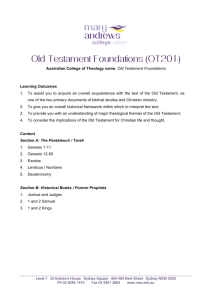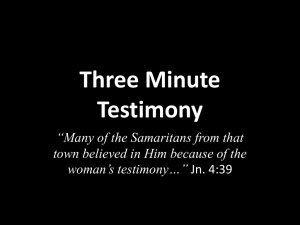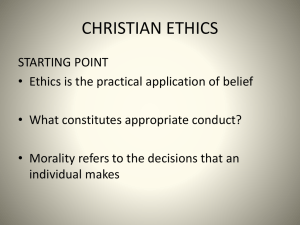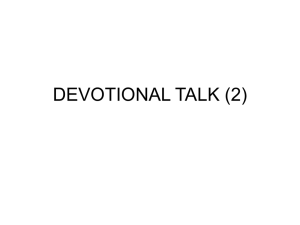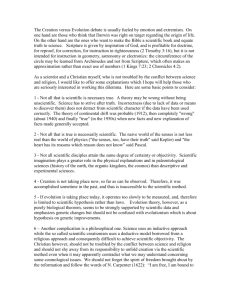Personal Ethics Statement An Ethics Statement Submitted to Dr
advertisement
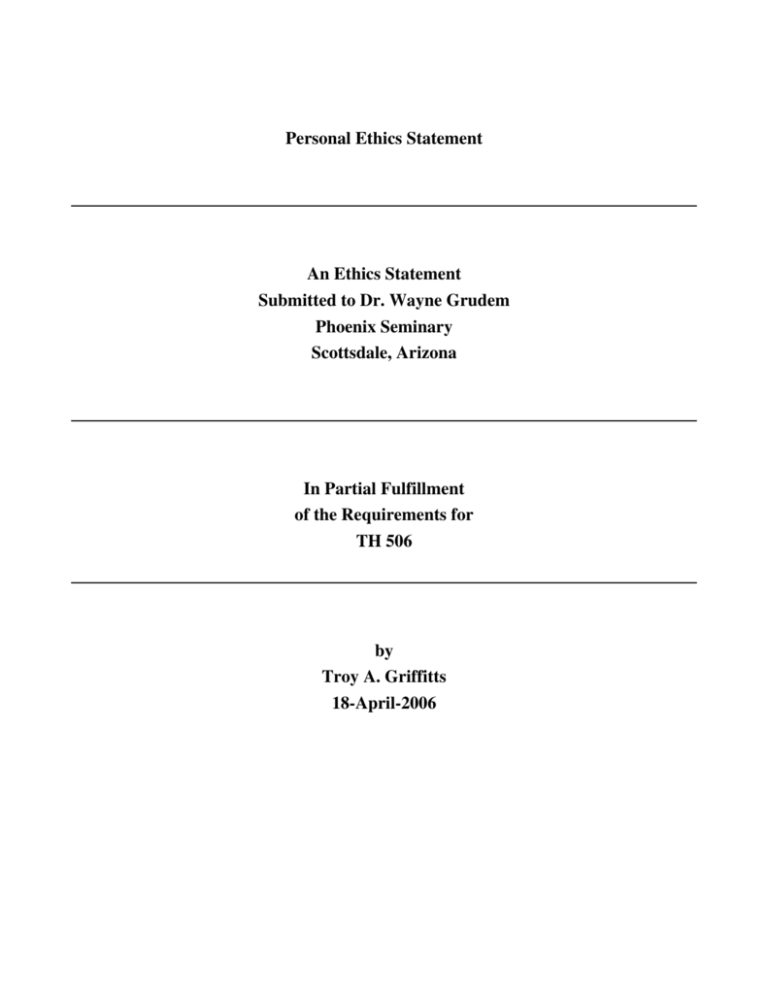
Personal Ethics Statement An Ethics Statement Submitted to Dr. Wayne Grudem Phoenix Seminary Scottsdale, Arizona In Partial Fulfillment of the Requirements for TH 506 by Troy A. Griffitts 18­April­2006 Introduction and Basics Christian ethics is the discipline of determining, from all of Scripture, what is or is not morally right or best given a life situation of personal choice. 2A proper understanding of Scripture is the foundation for the discipline of Christian ethics, and as such, requires one to maintain an ability to exegete Scripture properly by remaining in a right relationship with the Author and Provider of Scriptural understanding (I Cor. 2:11­16). 3God is the creator of all and is, Himself, the standard for the ethics of all things. The Character of God exemplifies ethical purity and, in general, is an example for mankind to model­­ excluding that which He has explicitly stated to be specific to God, Himself, alone; e.g., jealousy, vengeance, acceptance of worship. 1 4 Christians are free from the law as a means of earning salvation, which instead, is solely attained by trusting alone in the grace of God manifested in the payment for sin by sinless Christ (Rom. 3:21­26, 8:2). The written law of God is our tutor to show us our shortcomings and need for a sin payment (Gal. 3:24). Christ has come to write the law on our hearts. It is not sufficient merely to obey the physical commandments in the law; instead, what is required is a willing and obedient heart (Rom. 2:29, 6:17). 5All Christians have fallen short of God's requirements in heart and deed (Rom. 3:23; I John 1:6­10). This sin hinders a healthy relationship with God and thus our ability to properly understand His will for us (i.e. Christian ethics) (Rom. 12:2). Though sin is evil, God uses even sin to play a key role in His Divine will for creation. “Christ, Himself is the Divine appeasement (ἱλάσμος) concerning our sins, but not concerning those of us only, but rather even concerning [those] of the whole world (οὐ περὶ τῶν ἡμετέρων δὲ μόνον ἀλλὰ καὶ περὶ ὅλου τοῦ κόσμου) (I John 2:2). This Divine sacrifice for us, because of our sins, is the very thing that draws our hearts into a proper heart obedience to God and His law (i.e. the practice of Christian ethics), and also what initially allows us­­ rather draws us­­ into a saving relationship with God. the kindness of God leads you into repentence (τὸ χρηστὸν τοῦ θεοῦ εἰς μετάνοιαν σε ἄγει) Romans 2:4b and I, if I might be lifted up from the earth1, all I will draw to Myself (καγὼ ἐὰν ὑψωθῶ ἐκ τῆς γῆς , πάντας ἑλκύσω πρὸς ἐμαυτόν) John 12:32 but God demonstrates His own Love unto us, in that while we were still being sinners (συνίστησιν δὲ τὴν ἑαυτοῦ ἀγάπην εἰς ἡμᾶς ὁ θεὸς, ὅτι ἔτι ἁμαρτωλῶν ὄντων ἡμῶν) Christ, for us died. (Χριστὸς ὑπὲρ ἡμῶν ἀπέθανεν) Romans 5:8 1 “lifted up” = Christ's atoning sacrifice on the Cross of Calvary for our sins. cf v.33 If we love Christ, we will obey His commandments (I John 5:3, John 14:23). If we desire to see our service for our Lord prosper, we should desire to be found faithful with what He has entrusted to us (Matthew 25:21). 6 The Old Testament Law was given as a shadow of the true Form of the Law in Christ. The first Law was “unable, concerning moral conscience, to perfect the one doing the service.” (μὴ δυνάμεναι κατὰ συνείδησιν τελειῶσαι τὸν λατρεύοντα) (Hebrews 9:9b). Our obedience because of the sacrifice of Christ is the Law of Love (i.e. new Covenant) (I John 2:7­8) Old Testament Laws need to be examined for their purpose in their time. If they are timeless Truths, reaffirmed in the New Testament, they should still be observed. If Scripture merely details the outward cultural expression of an eternal Truth, the commandment should still be observed with an outward expression appropriate to contemporary culture. If commands are symbolic, yet commanded in the New Testament for us to continue in them (e.g. Baptism, the Lord's Supper), they should be observed with the same symbology today. 7 8 Scripture assures us of the sufficiency therein concerning our moral/ethical guidance (II Tim. 3:16; II Peter 1:3). The Holy Spirit leads us to apply His Word (i.e. Scripture) to our daily life (i.e. leads us in the practice of Christian ethics) (Gal. 5:16­18; Rom. 8:14). 9 The Decalogue begins by addressing the relationship of mankind with his Creator (Exod. 20:1­ 7) and continues into matters between men (Exod. 20:12­16), and concludes with an appeal to a right heart (Exod. 20:17). The foundation for understanding the Ten Commandments lies with the predicate that God's desire is for our best. It is not a selfish God Who tells us to not kill each other, steal from each other; even when He decrees our trust in Him alone, He knows all others will fail us. Specific Ethical Issues God requires undivided love of us (Josh. 23:11; Deut. 6:5). If we wholeheartedly love our Creator, we will have the life for which we were created. A true heart which loves God will obey His commandments (which seek our good), even if they are not understood. This is the New Covenant written on our hearts. 1 2 God is more than we could ever think of Him (Rom. 11: 32­36). He does not want our perception of Him to be misaligned, and thus forbids images of Himself (Exod. 20:4). Often, we find the best way to understand God's surpassing glory is to describe Him in terms of what He is not. To say that God is eternal, to most people, will bring into their minds a nebulous idea. To say God has no end, and no beginning, though beyond our experience, at least speaks to what we do experience daily: beginnings and ends. God is unbounded, uncontainable, has no limits to His power, sight, knowledge, justice, righteousness, love, and is God Whose mercies never fail! 3 As images of God misrepresent His Character, and are thus wrong, so also is directly denying His existence and potency by using His Name without meaning or with meaning which is not consistent with His Character (Exod. 20:7). 4We are meant to edify our fellow man with our tongue (Ephesians 4:29), and not use it to slander or in vulgarity (Eph. 5:4). Such talk often tarnishes our reputation and hinders our witness of the Gospel. 5In the arts, when one acts out the part of a non­ believer, pretending to swear or to do other non­Christian acts (e.g. murder) merely represent faithfully their assigned character. We should not think they are really murdering or swearing. The one command excepted is to not take the Name of the Lord God in vain (Exodus 20:7). To not ascribe the honor due our Creator when using His Name is an act that still takes place when dramatizing. 6 It is right to always speak truthfully (Exod. 20:16). It is not required of us to always tell everything we know. In trust relationships, it is right to tell everything we understand the trusting party would expect of us. 7 The Sabbath command, in the Decalogue, is a summary of the Sabbath Day, Sabbath Year, and other ceremonially observed days in ancient Israel. We are told, in the New Testament era, that we should not let anyone pass judgment on us concerning these things (Col 2:16­17). 8 We are to obey the governing authorities inasmuch as obeying them does not cause us to disobey Christ (Rom 13:1­10). 9 I believe civil governments have the right to exercise capital punishment because that is what the power to “bear the sword” meant in Romans 13:4. [ :) ] We also see God command capital punishment throughout the Old Testament (Deut. 17:5, 21:21). Often it is necessary and good, in this world, to engage in war to limit mass evil. A model example of this is the Allied resistance to the genocide of Hitler in WWII. A government's first obligation is to protect its people (Rom. 13:4). It is also right for a government to protect other governments when aggressively attacked (Obad. 11). 11I believe it is right to defend myself and family, even with lethal force, if absolutely necessary because this limits greater evil which would otherwise be exercised. 10 12 It is wrong to murder (Exod. 20:13). Unborn children are humans (Luke 1:41­44), and thus killing them constitutes murder (Exod. 21:22­25). If the life of the mother is at risk, as a last resort, the mother's life may be chosen for preservation over the life of the baby. 13 I believe Euthanasia is wrong (Exod. 20:13; II Sam. 1:10,14­16). If the patient would desire such, not providing life support when there is no hope of recovery from a completely debilitated state is a different matter and should be decided by those closest to the patient. I believe alcohol and drugs are mind altering chemical which cause us not to be sober minded. I believe they should be avoided except for proper medicinal purposes (I Peter 1:13; Eph. 5:18). I believe that many Christians immaturely partake in such activities 'to be cool' out of rebellion and this heart attitude is not morally correct. In America it is illegal to partake in these substances on many occasions, and we are bound to obey the governing authorities under these circumstance. The culture of our country also often associates alcohol with revelry, and we are to avoid even the appearance of evil (I Thess. 5:22). Certain ministry circumstances may warrant a casual partaking in such activity and the greatest good should always be considered. 14 15 All people are created in the image of God (Gen. 1:27) and thus should not be discriminated against (nor for) because of racial ethnicity. 16 I believe recreational sex between one man and one woman together in a committed marriage relationship is healthy and good (I Cor. 7:5), and unless children are a desired outcome, birth control is a wise choice. 17Homosexuality is an abomination (I Cor. 6:9; I Tim. 1:10) and is sometimes one consequence of a corrupted mind which has chosen for itself corruption of the true knowledge of God (Rom. 1:18­28; esp. 28). It is listed along with all other sins that separate man from God (see a I Cor. and I Tim. references above). A person with homosexual desires should be encouraged that God can heal from a corrupted mind; that most people struggle with sexual sin to some degree, but that they can be true to their spouse (or single to themselves) even in mind; that their's is not merely a distortion of a desire in degree or outside of a proper domain, but actually a distorted desire. They should be encouraged that a love for the same sex, and for relationships with such, is a good and holy thing, but it is not the domain, at any level, for sexual desire. One can, at the same time, adamantly reject this corrupt sexual desire, and embrace a love for the same sex. Because of homosexuality and pedophilia, sometimes the Church shies away from loves that should be embraced and are holy and healthy. 18 Divorce is never God's desire. If a believing spouse leaves a marriage, for reasons other than unfaithfulness, they should remain single or be reconciled to their spouse. If an unbelieving spouse leaves a believing partner, the believer is not bound in such circumstances, can accept the divorce, and remarry a believer (I Cor 10­16; Mark 10:2­11; Matt. 5:31­32; 19:9), if desired. We are to faithfully use for His Kingdom what God has entrusted to us (Matt. 25:14­30). Private ownership, assumed by the command “Thou shalt not steal,” gives us great opportunity to reflect the image of our Creator. 20Scripture assumes private ownership of property, wealth, and an inequality of possessions. It never tells us to distribute wealth equally, but merely to provide for the needs of our brother. Giving wealth to the poor is not always the best way to provide for their needs. For example, a wealthier man might save his money and eventually open a business where he can employ the poor and help them become profitable unto themselves. 21Lending, borrowing, and 19 charging interest is often a good way to invest and is encouraged in Scripture (Matt 25:27). Though, we also find a strict prohibition against oppression of the poor who borrow to survive (Lev 25:35­37; Deut. 23:19­20). 22Producing more goods and services is healthy for an economy and will provide more jobs to the poor. Before the fall, God calls man to subdue and have dominion over the earth (Gen. 1:28). We are obeying Him when we create new and better goods and services. Nations prosper because the people of a nation embrace Biblical principles like the equality of man (Gen. 1:27), the purpose of government to serve its governed (Rom. 13:4), private ownership of property (Exod. 20:15,17), and an ethic that sees hard work as good and proper (Col. 3:23). 23 It is wrong to desire what cannot, by any morally good means, become yours (e.g., your neighbor's wife). Desire, in and of itself, is not wrong; nor is desiring what one does not currently possess. Positive examples include: God's Law (Psalm 19:10), Christ, for the Passover with His disciples (Luke 22:15), a leadership position in the Body of Christ (I Tim. 3:1). 24 [note to Dr. Grudem: Ending with this last clause, coincidently, may or may not be beneficial when using this document while applying for a Church position :) ] Topics Covered Introduction and Basics 1. 2. 3. 4. 5. 6. 7. 8. 9. Definition of Christian ethics Personal requirements for studying ethics Theological basis for ethics: the character of God The Christian and the law of God Sin in the Christian life Various motives for obedience in the Christian life Old Testament laws and New Testament believers The sufficiency of Scripture for ethical guidance The structure of ethical study and the nature of the Ten Commandments Specific Ethical Issues 1. Our primary ethical obligation: to love the Lord our God 2. Pictures of God; pictures of Christ 3. Right and wrong use of God’s name 4. Swearing and other kinds of “impure” speech 5. Drama and films 6. Truthfulness and falsehood in speech 7. The Old Testament Sabbath and related laws 8. Authority within the State 9. Murder and capital punishment 10. War, nuclear war 11. Self defense 12. Abortion 13. Euthanasia 14. Alcohol and drugs 15. Racial justice and discrimination 16. Birth control 17. Homosexuality 18. Divorce 19. Stewardship 20. Wealth, poverty, inequality of possessions 21. Lending, borrowing, charging interest 22. Producing goods and services: is more better? 23. The wealth and poverty of nations: why are nations rich or poor? 24. Coveting


